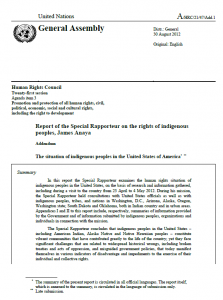Report Summary:
In this report the Special Rapporteur examines the human rights situation of
indigenous peoples in the United States, on the basis of research and information gathered,
including during a visit to the country from 23 April to 4 May 2012. During his mission, the Special Rapporteur held consultations with United States officials as well as with indigenous peoples, tribes, and nations in Washington, D.C., Arizona, Alaska, Oregon,
Washington state; South Dakota and Oklahoma, both in Indian country and in urban areas.
Appendices I and II to this report include, respectively, summaries of information provided by the Government and of information submitted by indigenous peoples, organizations and individuals in connection with the mission. The Special Rapporteur concludes that indigenous peoples in the United States – including American Indian, Alaska Native and Native Hawaiian peoples – constitute
vibrant communities that have contributed greatly to the life of the country; yet they face significant challenges that are related to widespread historical wrongs, including broken treaties and acts of oppression, and misguided government policies, that today manifest themselves in various indicators of disadvantage and impediments to the exercise of their individual and collective rights.
Significant federal legislation and programmes that have been developed over the last few decades, in contrast to early exercises of federal power based on misguided policies, constitute good practices that in significant measure respond to indigenous peoples’ concerns. Especially to be commended are the many new initiatives taken by the executive to advance the rights of indigenous peoples in the last few years.
The Special Rapporteur finds, however, that existing federal programmes need to be improved upon and their execution made more effective. Moreover, new measures are needed to advance toward reconciliation with indigenous peoples and address persistent deep-seated problems related to historical wrongs, failed policies of the past and continuing systemic barriers to the full realization of indigenous peoples’ rights.
The United Nations Declaration on the Rights of Indigenous Peoples is an important impetus and guide for improving upon existing measures to address the concerns of indigenous peoples in the United States, and for developing new measures to advance toward reconciliation. The Declaration, which is grounded in widespread consensus and fundamental human rights values, should be a benchmark for all relevant decision-making by the federal executive, Congress, and the judiciary, as well as by the states of the United States. The Special Rapporteur makes a series of recommendations in this regard.

